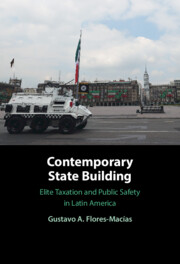Book contents
- Contemporary State Building
- Contemporary State Building
- Copyright page
- Dedication
- Contents
- Figures
- Tables
- Acknowledgments
- 1 Introduction
- 2 Latin America’s Elite Security Taxes
- 3 A Theory of Elite Taxation and the Determinants of Security Taxes
- 4 Colombia’s Targeted Security Taxes
- 5 Costa Rica’s “Soft” Security Taxes
- 6 El Salvador’s Failed and Diffuse Security Taxes
- 7 Mexico’s Uneven Taxation
- 8 Conclusion
- References
- Index
7 - Mexico’s Uneven Taxation
Published online by Cambridge University Press: 02 June 2022
- Contemporary State Building
- Contemporary State Building
- Copyright page
- Dedication
- Contents
- Figures
- Tables
- Acknowledgments
- 1 Introduction
- 2 Latin America’s Elite Security Taxes
- 3 A Theory of Elite Taxation and the Determinants of Security Taxes
- 4 Colombia’s Targeted Security Taxes
- 5 Costa Rica’s “Soft” Security Taxes
- 6 El Salvador’s Failed and Diffuse Security Taxes
- 7 Mexico’s Uneven Taxation
- 8 Conclusion
- References
- Index
Summary
Chapter 7 studies the case of Mexico, whose security situation has deteriorated dramatically over the last decade. It shows that, although a crisis-driven explanation would predict elites’ investment in strengthening the state, the federal government has not adopted – or even entertained – security taxes. Instead, this chapter shows how Mexican elites have been relatively less affected than their counterparts elsewhere in the region because of the geographic concentration of crime outside of Mexico City. This has translated into much less pressure on the federal government to address the public-safety situation. Consequently, elites’ impetus to invest in the fiscal strengthening of the state has been subdued at the national level and has taken place instead at the state level.
- Type
- Chapter
- Information
- Contemporary State Building , pp. 125 - 159Publisher: Cambridge University PressPrint publication year: 2022

